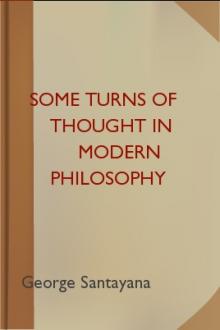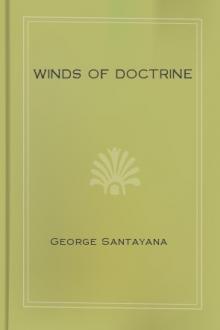Some Turns of Thought in Modern Philosophy, George Santayana [if you liked this book .TXT] 📗

- Author: George Santayana
- Performer: -
Book online «Some Turns of Thought in Modern Philosophy, George Santayana [if you liked this book .TXT] 📗». Author George Santayana
The Project Gutenberg EBook of Some Turns of Thought in Modern Philosophy
by George Santayana
This eBook is for the use of anyone anywhere at no cost and with
almost no restrictions whatsoever. You may copy it, give it away or
re-use it under the terms of the Project Gutenberg License included
with this eBook or online at www.gutenberg.net
Title: Some Turns of Thought in Modern Philosophy
Five Essays
Author: George Santayana
Release Date: September 17, 2005 [EBook #16712]
Language: English
*** START OF THIS PROJECT GUTENBERG EBOOK SOME TURNS OF THOUGHT IN ***
Produced by Juliet Sutherland, Michael Ciesielski and the
Online Distributed Proofreading Team at http://www.pgdp.net
BY
GEORGE SANTAYANA
NEW YORK
CHARLES SCRIBNER'S SONS
1933
Published under the auspices of
THE ROYAL SOCIETY OF LITERATURE
PRINTED IN GREAT BRITAIN
Paper read before the Royal Society of Literature on the occasion of the Tercentenary of the birth of John Locke. With some Supplementary Notes
1 II. Fifty Years of British IdealismReflections on the republication of Bradley's Ethical Studies
48 III. Revolutions in ScienceSome Comments on the Theory of Relativity and the new Physics
71 IV. A Long Way Round to NirvanaDevelopment of a suggestion found in Freud's Beyond the Pleasure Principle
87 V. The Prestige of the InfiniteA review of Julien Benda's Sketch of a consistent theory of the relations between God and the World
102The Author's acknowledgments are due to the Editors of The New Adelphi, The Dial, and the Journal of Philosophy, in which one or more of these Essays originally appeared.
I LOCKE AND THE FRONTIERS OF COMMON SENSE[1]A good portrait of Locke would require an elaborate background. His is not a figure to stand statuesquely in a void: the pose might not seem grand enough for bronze or marble. Rather he should be painted in the manner of the Dutch masters, in a sunny interior, scrupulously furnished with all the implements of domestic comfort and philosophic enquiry: the Holy Bible open majestically before him, and beside it that other revelation—the terrestrial globe. His hand might be pointing to a microscope set for examining the internal constitution of a beetle: but for the moment his eye should be seen wandering through the open window, to admire the blessings of thrift and liberty manifest in the people so worthily busy in the market-place, wrong as many a monkish notion might be that still troubled their poor heads. From them his enlarged thoughts would easily pass to the stout carved ships in the river beyond, intrepidly setting sail for the Indies, or for savage America. Yes, he too had travelled, and not only in thought. He knew how many strange nations and false religions lodged in this round earth, itself but a speck in the universe. There were few ingenious authors that he had not perused, or philosophical instruments that he had not, as far as possible, examined and tested; and no man better than he could understand and prize the recent discoveries of "the incomparable Mr Newton". Nevertheless, a certain uneasiness in that spare frame, a certain knitting of the brows in that aquiline countenance, would suggest that in the midst of their earnest eloquence the philosopher's thoughts might sometimes come to a stand. Indeed, the visible scene did not exhaust the complexity of his problem; for there was also what he called "the scene of ideas", immaterial and private, but often more crowded and pressing than the public scene. Locke was the father of modern psychology, and the birth of this airy monster, this half-natural changeling, was not altogether easy or fortunate.[2]
I wish my erudition allowed me to fill in this picture as the subject deserves, and to trace home the sources of Locke's opinions, and their immense influence. Unfortunately, I can consider him—what is hardly fair—only as a pure philosopher: for had Locke's mind been more profound, it might have been less influential. He was in sympathy with the coming age, and was able to guide it: an age that confided in easy, eloquent reasoning, and proposed to be saved, in this world and the next, with as little philosophy and as little religion as possible. Locke played in the eighteenth century very much the part that fell to Kant in the nineteenth. When quarrelled with, no less than when embraced, his opinions became a point of departure for universal developments. The more we look into the matter, the more we are impressed by the patriarchal dignity of Locke's mind. Father of psychology, father of the criticism of knowledge, father of theoretical liberalism, god-father at least of the American political system, of Voltaire and the Encyclopaedia, at home he was the ancestor of that whole school of polite moderate opinion which can unite liberal Christianity with mechanical science and with psychological idealism. He was invincibly rooted in a prudential morality, in a rationalised Protestantism, in respect for liberty and law: above all he was deeply convinced, as he puts it, "that the handsome conveniences of life are better than nasty penury". Locke still speaks, or spoke until lately, through many a modern mind, when this mind was most sincere; and two hundred years before Queen Victoria he was a Victorian in essence.
A chief element in this modernness of Locke was something that had hardly appeared before in pure philosophy, although common in religion: I mean, the tendency to deny one's own presuppositions—not by accident or inadvertently, but proudly and with an air of triumph. Presuppositions are imposed on all of us by life itself: for instance the presupposition that life is to continue, and that it is worth living. Belief is born on the wing and awakes to many tacit commitments. Afterwards, in reflection, we may wonder at finding these presuppositions on our hands and, being ignorant of the natural causes which have imposed them on the animal mind, we may be offended at them. Their arbitrary and dogmatic character will tempt us to condemn them, and to take for granted that the analysis which undermines them is justified, and will prove fruitful. But this critical assurance in its turn seems to rely on a dubious presupposition, namely, that human opinion must always evolve in a single line, dialectically, providentially, and irresistibly. It is at least conceivable that the opposite should sometimes be the case. Some of the primitive presuppositions of human reason might have been correct and inevitable, whilst the tendency to deny them might have sprung from a plausible misunderstanding, or the exaggeration of a half-truth: so that the critical opinion itself, after destroying the spontaneous assumptions on which it rested, might be incapable of subsisting.
In Locke the central presuppositions, which he embraced heartily and without question, were those of common sense. He adopted what he calls a "plain, historical method", fit, in his own words, "to be brought into well-bred company and polite conversation". Men, "barely by the use of their natural faculties", might attain to all the knowledge possible or worth having. All children, he writes, "that are born into this world, being surrounded with bodies that perpetually and diversely affect them" have "a variety of ideas imprinted" on their minds. "External material things as objects of Sensation, and the operations of our own minds as objects of Reflection, are to me", he continues, "the only originals from which all our ideas take their beginnings." "Every act of sensation", he writes elsewhere, "when duly considered, gives us an equal view of both parts of nature, the corporeal and the spiritual. For whilst I know, by seeing or hearing,... that there is some corporeal being without me, the object of that sensation, I do more certainly know that there is some spiritual being within me that sees and hears."
Resting on these clear perceptions, the natural philosophy of Locke falls into two parts, one strictly physical and scientific, the other critical and psychological. In respect to the composition of matter, Locke accepted the most advanced theory of his day, which happened to be a very old one: the theory of Democritus that the material universe contains nothing but a multitude of solid atoms coursing through infinite space: but Locke added a religious note to this materialism by suggesting that infinite space, in its sublimity, must be an attribute of God. He also believed what few materialists would venture to assert, that if we could thoroughly examine the cosmic mechanism we should see the demonstrable necessity of every complication that ensues, even of the existence and character of mind: for it was no harder for God to endow matter with the power of thinking than to endow it with the power of moving.
In the atomic theory we have a graphic image asserted to describe accurately, or even exhaustively, the intrinsic constitution of things, or their primary qualities. Perhaps, in so far as physical hypotheses must remain graphic at all, it is an inevitable theory. It was first suggested by the wearing out and dissolution of all material objects, and by the specks of dust floating in a sunbeam; and it is confirmed, on an enlarged scale, by the stellar universe as conceived by modern astronomy. When today we talk of nuclei and electrons, if we imagine them at all, we imagine them as atoms. But it is all a picture, prophesying what we might see through a sufficiently powerful microscope; the important philosophical question is the one raised by the other half of Locke's natural philosophy, by optics and the general criticism of perception. How far, if at all, may we trust the images in our minds to reveal the nature of external things?
On this point the doctrine of Locke, through Descartes,[3] was also derived from Democritus. It was that all the sensible qualities of things, except position, shape, solidity, number and motion, were only ideas in us, projected and falsely regarded as lodged in things. In the things, these imputed or secondary qualities were simply powers, inherent in their atomic constitution, and calculated to excite sensations of that character in our bodies. This doctrine is readily established by Locke's plain historical method, when applied to the study of rainbows, mirrors, effects of perspective, dreams, jaundice, madness, and the will to believe: all of which go to convince us that the ideas which we impulsively assume to be qualities of objects are always, in their seat and origin, evolved in our own heads.
These two parts of Locke's natural philosophy, however, are not in perfect equilibrium. All the feelings and ideas of an animal must be equally conditioned by his organs and passions,[4] and he cannot be aware of what goes on beyond him, except as it affects his own life.[5] How then could Locke, or could Democritus, suppose that his ideas of space and atoms were less human, less graphic, summary, and symbolic, than his sensations of sound or colour? The language of science, no less than that of sense, should have been recognised to be a human language; and the nature of anything existent collateral with ourselves, be that collateral existence material or mental, should have been confessed to be a subject for faith and for hypothesis, never, by any possibility, for absolute or direct intuition.
There is no occasion to take alarm at this doctrine as if it condemned us to solitary confinement, and to ignorance of the world in which we live. We see and know the world through our eyes and our intelligence, in visual and in intellectual terms: how else should a world be seen or known which is not the figment





Comments (0)